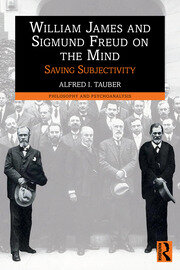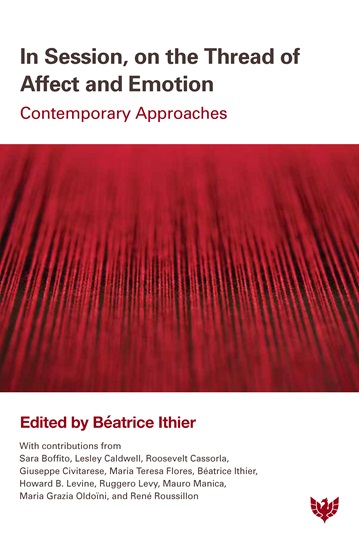William James and Sigmund Freud on the Mind: Saving Subjectivity
Part of Philosophy and Psychoanalysis series - more in this series

Book Details
- Publisher : Routledge
- Published : March 2025
- Cover : Paperback
- Pages : 212
- Category :
Forthcoming - Category 2 :
Psychoanalysis - Catalogue No : 97973
- ISBN 13 : 9781032900360
- ISBN 10 : 1032900369
Also by Alfred I. Tauber
Freud, the Reluctant Philosopher
Price £30.00
There are currently no reviews
Be the first to review
This is the first extended study comparing the philosophies of mind promoted by Sigmund Freud and William James, whose opposing views had profound influences on the development of 20th century philosophy, cognitive science, and psychology.
Each asked, can the mind be scientifically characterized? While Freud thought that psychoanalysis had established a science of the mind, James maintained that the subjective could not be objectified, and psychology was left with only “the crumbs” of analysis. Tauber’s presentation of a conjured philosophical confrontation occasioned by their first and only meeting in 1909 uncovers the clashing philosophies of mind underlying their respective positions. In comparing their opposing portraits of the psyche, persistent questions about self-knowledge, personal identity and moral agency are presented at their fin de siècle origin. In this setting, the James-Freud dispute offers a unique perspective about our own contemporary dilemmas swirling around selfhood, consciousness, and the subjectivity of human experience.
This eclectic history of early psychology will interest psychoanalysts, psychologists, and philosophers as well as those interested in the origins of pragmatism, phenomenology, modernism, and twentieth-century positivism.
Reviews and Endorsements
Alfred Tauber offers us a lucid and satisfying presentation and comparison of William James’s subjectivism--his study of experience itself—and Sigmund Freud’s contrasting objectivism, in which the mind was understood as an entity separate from the observer. But Tauber is not satisfied with a mere comparison: he shows us why and how these differences have mattered—in both intellectual and social/political life. The book is an eye-opener; it is downright exciting—perhaps especially for psychoanalysts and psychoanalytic psychotherapists. How is it that this comparative study was not tackled until now?
Donnel B. Stern, William Alanson White Institute, New York University Postdoctoral Program in Psychoanalysis and Psychotherapy
William James and Sigmund Freud on the Mind is a startling original contribution, not only to the debates about human psychology and subjectivity, but also to the role that 'American pragmatism' has had in shaping our understanding of the world about us. If the debate seems to be between Freud and James about whether science can define the essence of the human, it is also about how the claims about individual autonomy, often seen as the hallmark of American pragmatism, has come—for good or for ill—to define our modernity. Alfred I. Tauber’s writing is clear and crisp—forcing us to ask how much our understanding of ourselves is embedded in what we define as 'human.'
Sander L Gilman, author of Freud, Race, and Gender
Finally, a long overdue study on the confrontation between James and Freud. As Tauber masterfully demonstrates, Freud’s psychoanalysis was born within a historical epoch that assumed the truth of positivist assumptions, against which James would protest vigorously. James rejected Freud’s “dualistic” approach; instead promoting the primacy of human experience. Their feuding conceptions of the mind animated the development of modern psychology, a division yet to be fully explored. Tauber has now remedied that deficiency.
Dustin J. Byrd, Professor of Philosophy and Religion, The University of Olivet
Table of Contents
Introduction
1. Freud’s Philosophy of Mind
2. James’s Assault on Metaphysical Dualism
3. Concerning Subjectivity
4. Attending to Thought
5. The Enigmatic Self
6. On Agency
Conclusion
About the Author(s)
Alfred I. Tauber, Professor Emeritus of Philosophy and Zoltan Kohn Professor Emeritus of Medicine, Boston University, has extensively published in philosophy and history of science that include philosophical critiques of psychoanalysis and Freud’s contemporary significance in Freud, the Reluctant Philosopher and Requiem for the Ego: Freud and the Origins of Postmodernism.
Customer Reviews
Our customers have not yet reviewed this title. Be the first add your own review for this title.
You may also like
Night Vision: Wilfred Bion's Epistemological Poetics and the Experience of the...
Dominic Angeloch
Price £23.19
save £5.80
Raising Confident Teenagers: The Take 3 Approach to Parenting Calmly in a...
Rosie Hill
Price £15.19
save £3.80
In Session, on the Thread of Affect and Emotion: Contemporary Approaches
Beatrice Ithier
Price £19.19
save £4.80








